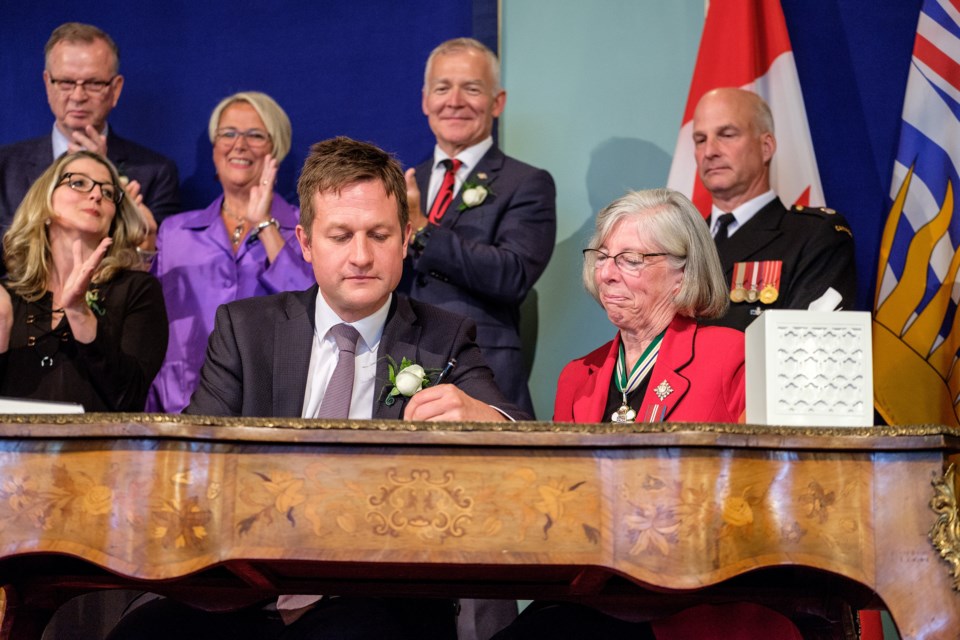Just who is Rob Fleming, B.C.’s new education minister?
Here’s what we know so far: Fleming grew up on Vancouver’s North Shore, attending West Bay elementary and West Vancouver secondary. He moved to Victoria more than 20 years ago for university and work and still lives there today with his wife and two kids. His kids, a girl, 10, and a boy, 7, also go to public school.
He says his hobbies are playing and watching sports and that he’s an avid reader — most recently reading a Ben Macintyre history book about Allied espionage during the Second World War. Fleming has a degree in history from the University of Victoria.
He was first elected in Victoria-Hillside (renamed Victoria-Swan Lake) in 2005 and has represented the area in the Legislature ever since. He was a Victoria city councillor before that and for the past several years has been the NDP’s official critic for education.
But now, he’s the minister, with responsibility for all that entails, including deciding what to do with the Vancouver School Board, figuring out how to speed up the process of getting schools safe in case there is an earthquake and ensuring new schools are built in growing areas and maintained in other areas.
It’s a big task and one that could be prickly for a former critic. But Fleming says his past is a plus.
“I think it’s a tremendous advantage for me because there are so many urgent issues that need decisions and a fresh pair of eyes,” Fleming said.
First off, Fleming is promising to speed up seismic upgrades. He says one of his goals is to build a lot of schools and make sure schools are in excellent condition and are safe for everyone who learns and works in them.
He says the NDP budget that will come out in September will contain a “very ambitious capital plan — probably the most ambitious in a quarter century.” It will include not just money for new schools and to fix up old schools, but also money to relieve the burden on parents, who have had to fundraise for things like playground equipment, textbooks, computers and even food, he says.
Many districts, including Vancouver, have said they are short on the funds to hire enough teachers to fully implement rules on class size, class composition and specialist teacher ratios that were stripped by the Liberals, but restored by the Supreme Court of Canada last fall.
Fleming says he will be personally speaking with all 60 school board chairs in the province to discuss where they are short to implement the contract and concerns about space in schools.
“I think there are some districts that are going to be able to handle this very well for this school year and it’s going to be bumpy in others,” Fleming said.
There is a new deputy minister for education, Scott MacDonald, who was previously a teacher and has worked as an assistant deputy minister in the jobs, tourism and skills ministry and before that in the education ministry.
About the Vancouver School Board, which is being run by an appointed, official trustee, Dianne Turner, Fleming said he would like to see the return of an elected board. He will be meeting with Turner next week, as well as with City of Vancouver officials, to discuss a possible byelection.
“Vancouver is a large district. It deserves — requires in fact — a democratically elected board for legitimacy, but also representation,” he said. “We want an elected level of government to work with our government.”
Although he says he didn’t like the way his predecessor fired elected trustees, who failed to pass a balanced budget, he does not have any problem with Turner and he expects her to stay in place until a byelection is held. He promised a decision on the timing of the byelection within a couple of weeks.
The province is in for a “sea of change in attitude towards education,” he said.
“John Horgan believes and is making it his priority to make significant investments in education — that’s part of his economic and social development strategy and it’s part of our belief as a government that a lot of incredible public benefits flow from a strong education system including reduced inequality, more innovation, more human capital and economic investment and overall wellbeing in other health and social determinants.”
Tracy Sherlock writes about education and social issues. She can be reached at tracy.sherlock@gmail.com.



